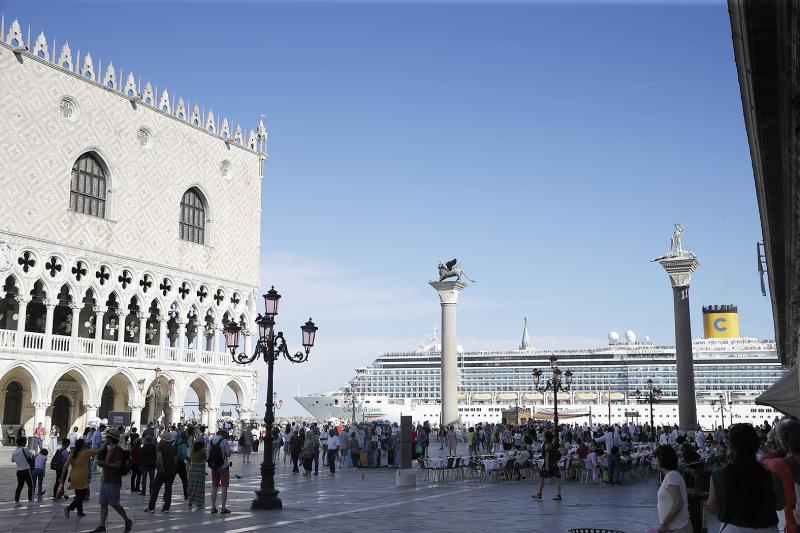Large cruise ships are to be banned from sailing into the center of Venice from Aug. 1, the Italian government announced on Tuesday after years of warnings they risk causing irreparable damage to the lagoon city.
The decision comes just days before a meeting of UNESCO, which had proposed to add Venice to its list of endangered heritage sites.
“The decree adopted today represents an important step for the protection of the Venetian lagoon system,” Italian Prime Minister Mario Draghi said after the decree was approved at a Cabinet meeting.

Photo: AP
He added that there would be money to mitigate the impact on employment.
The move would see the biggest ships diverted to the city’s industrial port of Marghera, but that is viewed as only a temporary solution, with ministers calling for ideas on a new permanent terminal.
The passengers aboard cruise ships provide a huge economic boost to Venice, but many residents say the floating hotels should not sail past the iconic St Mark’s Square.
They warn the ships cause large waves that undermine the city’s foundations and harm the fragile ecosystem of its lagoon.
The debate was reignited by the return last month of cruises after the COVID-19 pandemic.
Venice was put on UNESCO’s heritage list in 1987 as an “extraordinary architectural masterpiece,” but the body last month said that there was a need for “more sustainable tourism management.”
After years of debate, Italian Minister of Culture Dario Franceschini said that the government had decided to act now “to avoid the real risk of the city’s inclusion on the endangered world heritage list.”
“From August 1, large ships will no longer be able to reach Venice through the St Mark’s Basin, the St Mark’s Canal or the Giudecca Canal,” Italian Minister of Infrastructure and Transport Enrico Giovannini said.
There would be compensation for those who lose out from the move and 157 million euros (US$185 million) is to be invested in Marghera port.
He said the ban was a “necessary step to protect the environmental, landscape, artistic and cultural integrity of Venice.”
It is to only apply to the biggest ships, with those carrying about 200 passengers viewed as “sustainable” and allowed to enter.
Those that fulfill any of four criteria are to be banned: weighing more than 25,000 tonnes, measuring more than 180m long, more than 35m high or producing more than 0.1 percent sulfur.
Marco Michielli, vice president of tourism association Confturismo, said the new law represented a “good compromise.”
“The Marghera solution would maintain port activity in Venice, on the one hand safeguard jobs and activities, and on the other free up the Giudecca Canal,” he said.
The issue of cruise ships in Venice has sparked global debate, and last month celebrities and cultural figures, including Mick Jagger and Francis Ford Coppola, issued a call for action.
In an open letter to the Italian government calling for a range of measures to better protect the city, they said that the historic site risked being “swept away” by cruise ships.

To many, Tatu City on the outskirts of Nairobi looks like a success. The first city entirely built by a private company to be operational in east Africa, with about 25,000 people living and working there, it accounts for about two-thirds of all foreign investment in Kenya. Its low-tax status has attracted more than 100 businesses including Heineken, coffee brand Dormans, and the biggest call-center and cold-chain transport firms in the region. However, to some local politicians, Tatu City has looked more like a target for extortion. A parade of governors have demanded land worth millions of dollars in exchange

An Indonesian animated movie is smashing regional box office records and could be set for wider success as it prepares to open beyond the Southeast Asian archipelago’s silver screens. Jumbo — a film based on the adventures of main character, Don, a large orphaned Indonesian boy facing bullying at school — last month became the highest-grossing Southeast Asian animated film, raking in more than US$8 million. Released at the end of March to coincide with the Eid holidays after the Islamic fasting month of Ramadan, the movie has hit 8 million ticket sales, the third-highest in Indonesian cinema history, Film

Taiwan Semiconductor Manufacturing Co’s (TSMC, 台積電) revenue jumped 48 percent last month, underscoring how electronics firms scrambled to acquire essential components before global tariffs took effect. The main chipmaker for Apple Inc and Nvidia Corp reported monthly sales of NT$349.6 billion (US$11.6 billion). That compares with the average analysts’ estimate for a 38 percent rise in second-quarter revenue. US President Donald Trump’s trade war is prompting economists to retool GDP forecasts worldwide, casting doubt over the outlook for everything from iPhone demand to computing and datacenter construction. However, TSMC — a barometer for global tech spending given its central role in the

Alchip Technologies Ltd (世芯), an application-specific integrated circuit (ASIC) designer specializing in server chips, expects revenue to decline this year due to sagging demand for 5-nanometer artificial intelligence (AI) chips from a North America-based major customer, a company executive said yesterday. That would be the first contraction in revenue for Alchip as it has been enjoying strong revenue growth over the past few years, benefiting from cloud-service providers’ moves to reduce dependence on Nvidia Corp’s expensive AI chips by building their own AI accelerator by outsourcing chip design. The 5-nanometer chip was supposed to be a new growth engine as the lifecycle